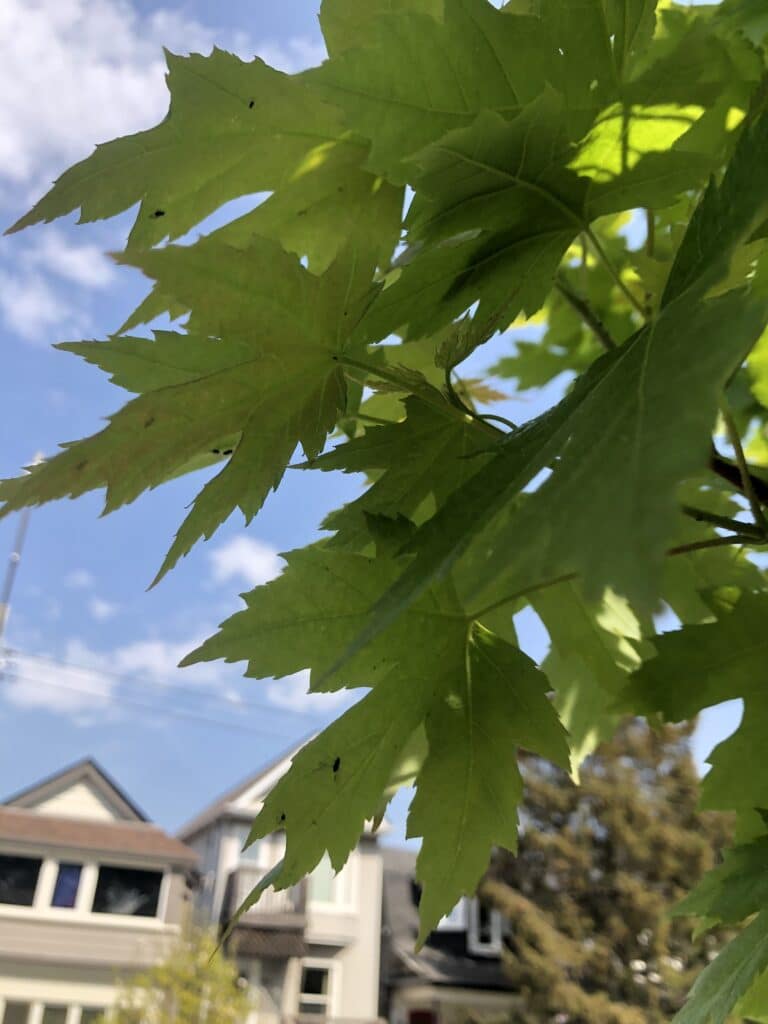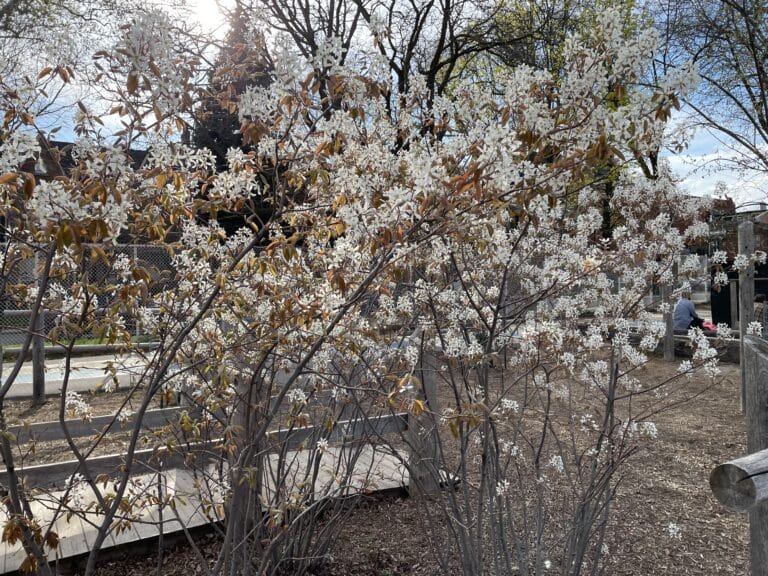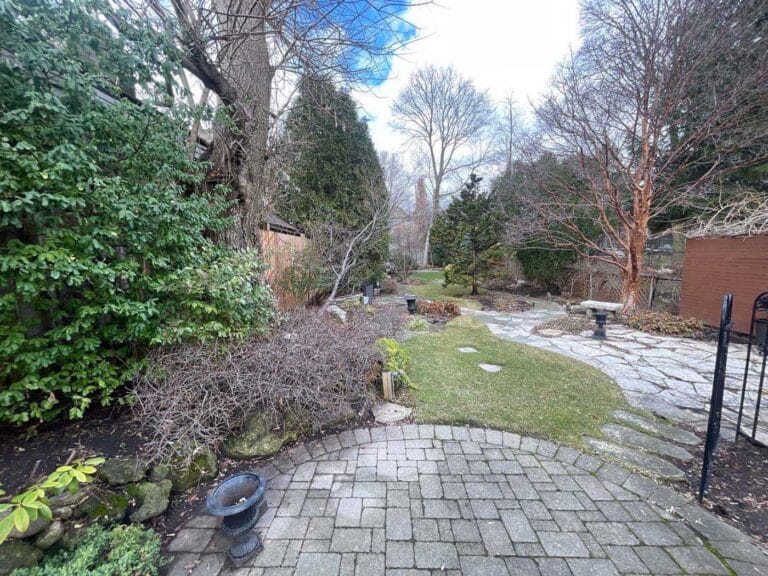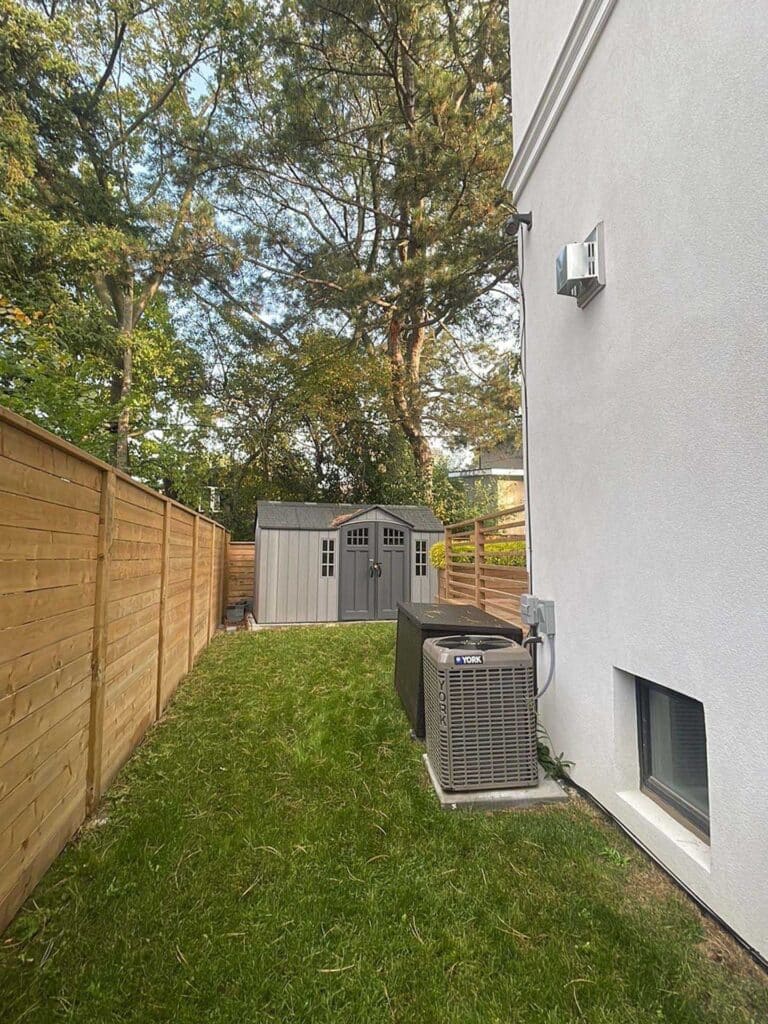Aphid ‘spitting’ has many options for treatment
If you’ve noticed a greenish-yellow residue on your plants or yard around late May or early June, you may have wondered where it comes from. Aphid “honeydew” is a substance excreted by aphids in late spring, and found on tree and plant leaves, as well as surfaces below trees and plants.
It’s not quite as gross as it sounds: aphids’ diet is entirely plant sap, so the substance you may find on your leaves, deck, barbecue, or car isn’t much different from regular sap. Certain species of ash, beech, cedar, chestnut, elm, fir, hickory, maple, oak, pine, poplar, spruce, and willow trees produce sap that feeds aphids. A few other plants, including currants, grapes, and sunflowers, also produce this sap.
To get rid of aphid honeydew, you’ll need to get rid of the aphids. Fortunately, there are many effective treatments to remove aphids on plants. For trees, certified arborists and plant healthcare workers in Ontario can offer effective professional insecticidal treatments for your trees. Some other treatments can supplement these and be done either by a professional, or by homeowners and residents.
Aphids in Ontario

Small numbers of aphids are common in yards and gardens. As long as they remain few in number, they won’t cause problems; it’s when they establish large colonies that they can cause serious damage. Honeydew iteself does not hurt plants, but damage from the aphids can weaken the plant — along with the annoying mess caused by aphid honeydew.
Southern Ontario’s aphids tend to appear in late spring each year, usually late May to early or mid-June, and they stick around all summer.
Green peach aphids and potato aphids are the most common aphid types in Southern Ontario, both small and yellow-green in colour. You’ll commonly find them on the undersides of leaves.
Woolly Aphids
Woolly aphids have a very different appearance. If you’ve noticed something that looks like bits of cotton or white mould along branches, twigs or leaves of trees, you may have a woolly aphid problem. These hairy insects are covered in white fuzz.
Honeydew from woolly aphids can turn into a black fungus that looks like soot. This fungus is unattractive, and if it spreads widely over a tree, it can start to block sunlight from getting to the trunk and branches.
Aphid Treatment for Trees
A certified arborist or pest management professional can offer an insecticidal treatment to your trees to control a large aphid infestation. In Ontario, insecticidal treatments like this can only be administered by licensed professionals.
Vista Tree offers aphid treatment with ACECAPS, a systemic insecticide inserted into a tree by drilling a hole then hammering in a cap of the insecticide. This treatment should be done in springtime, when leaves on trees have come out and before an infestation is in full peak during the summer months.
This treatment is ideal for aphid honeydew in large trees, where spraying the full tree is impractical or impossible. The caps are placed at intervals through the tree and the insecticide will work itself through the interior of the tree, killing aphids and several other destructive insects. Protection lasts for between 12 and 18 weeks, depending on the scale of the infestation.
ACECAPS are not suitable for fruit trees or any trees where nuts or sap are consumed.
Live Ladybugs for Aphids

What eats aphids? If you’re a gardener, you may be familiar with this treatment. Ladybugs are a natural predator of aphids. Live ladybugs lay eggs on your aphid-infested plants, and the resulting larvae will eat aphids.
Boxes of hundreds or thousands of dormant ladybugs can be purchased from some garden centres and big box or hardware stores in the summer each year, normally through late June in the GTA and Southern Ontario, though the exact shipping dates will vary based on the weather forecast. If it’s too hot, over 30°C, you should wait for cooler weather.
Ladybugs are kept in the fridge until you’re ready to release them.You should release ladybugs at dusk or in the early evening, as they will fly away in the heat of the daytime. Release them into a garden bed, watering the area first. Spacing out the release of a package over a few days will give the best results.
Insecticidal Soap and Prevention for Next Season
Insecticidal soap, such as Safer’s Insecticidal Soap, is a safe product for treatment on plants (including edible plants like cucumbers and tomatoes). Safer’s and similar products are made from potassium salts and safe for the general public to use. They contain no synthetic chemicals and work as a contact poison on soft-bodied insects like aphids.
To supplement a treatment like ACECAPS, you can spray insecticidal soap regularly on your plants through the summer, making sure you coat both the top and bottom of leaves. Avoid spraying in very hot weather over 32°C.
Regular use of organic fertilizer in your garden also helps to control nitrogen levels, which will help keep aphids out.
Honeydew Cleanup
Since aphid honeydew is essentially just sugar from trees, aphid honeydew removal is safe and easy. You can use a hose, or water with a couple tablespoons of vinegar mixed in, to wash it off surfaces like patios, outdoor furniture, playscapes, or vehicles. A soft cloth or scrub brush can be used for cleaning, depending on the surface.
It’s the right time of year to be thinking about aphid treatments for your trees! For assistance with aphid removal and insecticide treatment, contact Vista Tree to find out about your treatment options.





4 thoughts on “Sticky No More! Aphids and Honeydew Treatment”
Please contact me to let me know if there is a solution for this problem and how much your charge.
Hi Fred,
We will send you an email today about this! We can certainly help you out.
We have a Lynden Tree in our front yard which has aphids in the spring and summer. Our cars are being ruined by the “honeydew” emitted.
Do you spray for these pests and if so what would the charge be? Also how long does the treatment last.
Thank you.
Hi Robin,
There are a coupe, of sprays though the most effective treatment is going to be ACECAPS which is a systemic insecticide that targets the aphids. The trouble with aphid infestations that are particularly bad is that they are usually occurring due stress the tree is undergoing – as a front yard tree your linden is likely experiencing some systemic stress (drought, root damage/soil compaction, even pollution). It’s also possible it has multiple overlapping health issues that are making it more vulnerable to aphids. The honeydew is terrible for cars and a real nuisance.. I had a large honeylocust with the same problem at my childhood home that did the same thin for years long before I was an arborist. I mention the above because almost all insect-based problems are difficult to eradicate and have to be treated every year or two unless the underlying vulnerability is also relieved. It’s hard to know what that would be without seeing, but sometimes it is as simple as adding some mulch, watering the tree in the summer and doing one treatment of ACECAPS. We’d have to come take a look to give you a fully informed opinion. The ACECAPS are $175 – $250 depending on the size of the tree and are installed once and are effective 1-2 years. Ideally we’d like to ensure the underlying issue is also treated so a recurrence is less likely. If you want to know more or consult on the problem, feel free to give our office a call at 417-757-0505 as we can do a free on site consultation.
Have a great day!